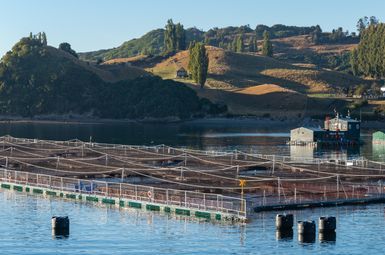
Humanity can farm more food from the seas to help feed the planet while shrinking mariculture’s negative impacts on biodiversity, according to new research led by the University of Michigan.

Though there is an unprecedented quantity of food worldwide today, over one billion people lack adequate access to healthy food. Meanwhile, industrial food systems generate considerable greenhouse gas emissions, while obesity and diet-related diseases persist. University of Michigan researchers are analyzing how food access disparities manifest in different communities, and are assessing the efficacy of current and potential policy solutions. Experts at the Sustainable Food Systems Initiative coordinate multidisciplinary approaches, while the Campus Farm and U-M Sustainable Food Program provide living, learning laboratories for U-M students to support more equitable food systems.

Humanity can farm more food from the seas to help feed the planet while shrinking mariculture’s negative impacts on biodiversity, according to new research led by the University of Michigan.
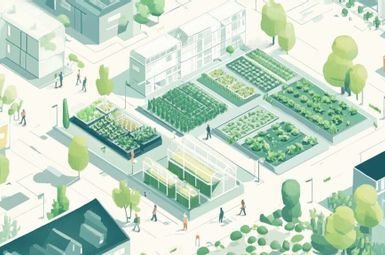
Built on the expertise and experiences of urban agriculturalists, along with research from the University of Michigan, a new policy brief urges Congress to fully fund the Office of Urban Agriculture.
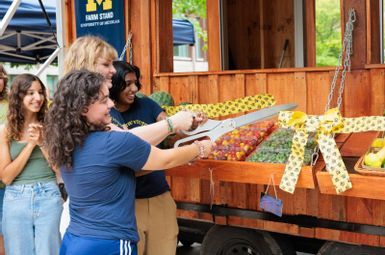
A new trailer is an exciting step forward in making fresh, local produce more accessible to the campus community.
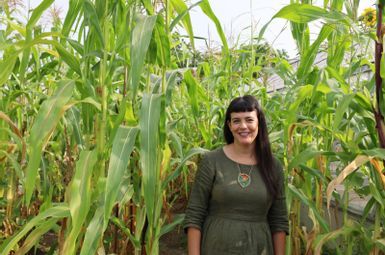
Maples is an Anishinaabe seed keeper, educator, and community organizer who has dedicated over a decade of work to Indigenous food sovereignty and justice.

Each year, hundreds of thousands of Michigan parents worry whether they can afford to feed their children. Increased food prices, the state’s housing crisis, and the end of COVID-era financial support have all led to more Michigan families experiencing food insecurity today than before the pandemic.
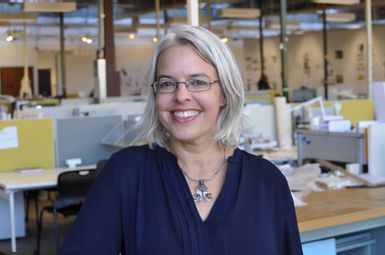
Urban agriculture can support cities’ wider goals and provide residents with self-grown, nutritious food if more governments start supporting – instead of criminalizing – the practice, Taubman College faculty member Lesli Hoey argues in a new book.
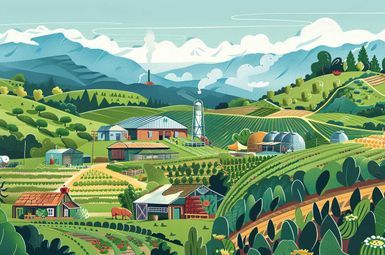
Faced with an ecological crisis, public health emergencies and socioeconomic inequities, agroecology emerges as a transdisciplinary beacon of hope.
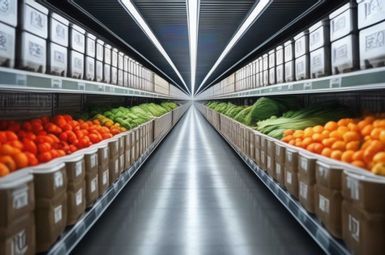
About a third of the food produced globally each year goes to waste, while approximately 800 million people suffer from hunger, according to the U.N.’s Food and Agriculture Organization.

U-M is marking late March and all of April with a series of events focused on sustainability and climate action, continuing a tradition that began with the first “Teach-In on the Environment” in 1970—which grew into what is now known as Earth Day.
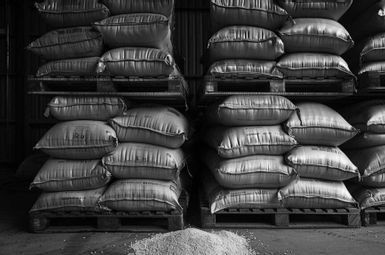
Rice exported to Haiti—mostly from the United States—contains unhealthy levels of arsenic and cadmium, which can increase the risk of various cancers, heart disease, diabetes and other illnesses, new research shows.
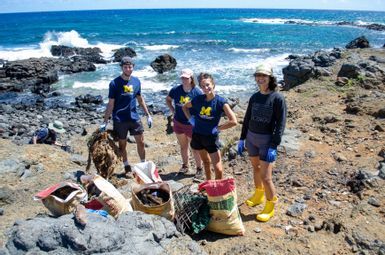
Spearheaded by SEAS PhD candidate Malu Castro, whose family is from Moloka‘i, the work of the first project supports one of the largest Land Back efforts in the modern era of the movement, and the second contributes to fostering and maintaining the longstanding tradition of subsistence agricultural production and other efforts to promote food sovereignty on the island.
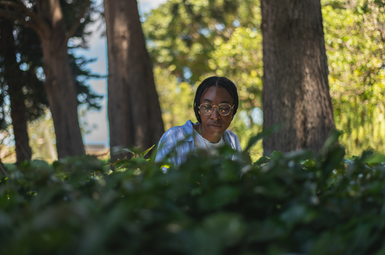
Alexa White studies sustainable agriculture in connection with a broader focus on environmental justice. What sustainable agriculture means to people from different parts of the world—and from different socioeconomic strata—is the focus of her dissertation work as a Ph.D. candidate in ecology and evolutionary biology. What environmental justice means to her is, “the right and autonomy for individuals to have access to fresh food, water, and basic human resources without being disenfranchised or oppressed.”

"We all know that food is a basic need, a basic right. How do we make refugees feel welcome? My solution was to have a refugee garden.”
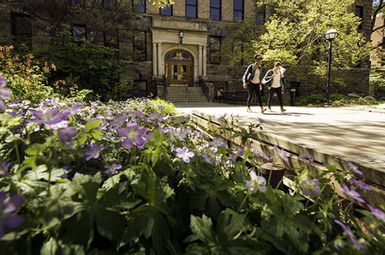
"We often say you don’t know where you’re going unless you know where you came from. Studying our history and being aware of all of the deep nuances of Black ag history is so important for what we’re doing today."

Michigan is blessed with a significant portion of the world’s freshwater supply, but water quality and affordability have been persistent issues affecting households throughout the state. Because of the suburbanization of poverty, there are now more residents struggling to afford and access clean, safe water in suburban communities where there are also fewer social welfare institutions to meet their needs.
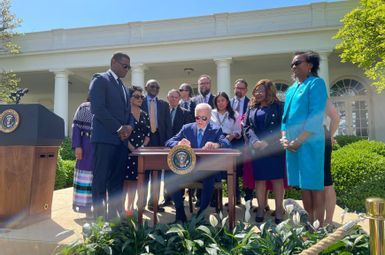
President Biden signed a historic executive order called Revitalizing Our Nation’s Commitment to Environmental Justice for All, which will direct federal agencies to focus on confronting longstanding environmental injustices. Kyle Whyte, the George Willis Pack Professor at the U-M School for Environment and Sustainability (SEAS), a U.S. Science Envoy, and a member of the White House Environmental Justice Advisory Council, served as an advisor on the development of the executive order.
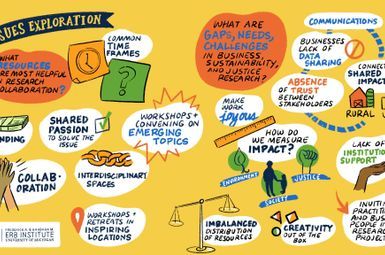
Instances of injustice lie everywhere—from workers’ rights violations to pollution that disproportionately harms low-income communities of color. The Erb Institute recently convened the workshop “Building Connections for Business, Sustainability & Justice Research,” bringing together scholars, corporate leaders and advocates to explore how research can inform solutions to pressing environmental, social and racial justice challenges.
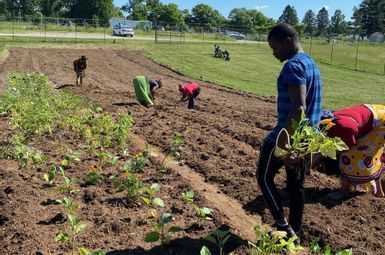
Grown from an idea cultivated by U-M student Phimmasone Kym Owens, a collaboration between Jewish Family Services of Washtenaw County (JFS) and Matthaei Botanical Gardens and Nichols Arboretum (MBGNA) has given rise to an area that has been dubbed by its users as “The Freedom Garden” – a space where refugee clients can grow their own food through community gardening.
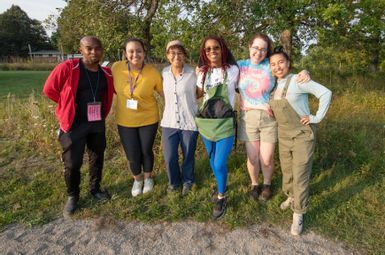
The Transformative Food Systems (TFS) Fellowship was created to attract student leaders who reflect the communities that are most affected by the interrelated environmental, health and economic food systems crises. The two-year program provides selected fellows with the learning and training needed to enable them to transform food systems to be equitable, healthy, and ecologically sound.

U-M environmental justice expert Kyle Whyte is one of seven distinguished scientists in the country named U.S. Science Envoys by the Department of State. Through the Science Envoy Program, eminent U.S. scientists and engineers travel to foreign countries as private citizens, leveraging their expertise and networks to forge connections and identify opportunities for sustained international cooperation.
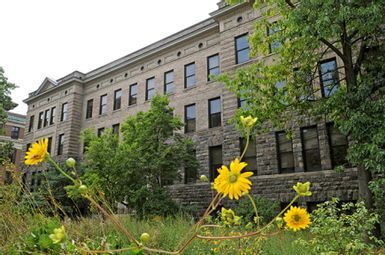
The U-M School for Environment and Sustainability (SEAS) announced a new $1 million award to catalyze the field of climate justice in the Midwest. Led by the Tishman Center for Social Justice and the Environment at SEAS, these funds will support the development of students as the next generation of environmental justice leaders and place them within environmental justice (EJ) organizations, while providing full-ride scholarships and summer internship grants.
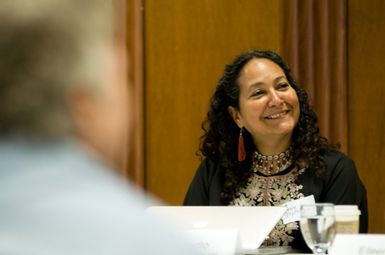
U-M Professor Ivette Perfecto recently highlighted the intersection of biodiversity conservation with agriculture on coffee farms. She stated that “about 40% of the Earth’s terrestrial surface is an agricultural system.” While many people may think that agriculture is always harmful to biodiversity, Perfecto says that many agricultural systems, such as the coffee agroforestry systems, can be diverse and “contribute significantly to the conservation of biodiversity.”
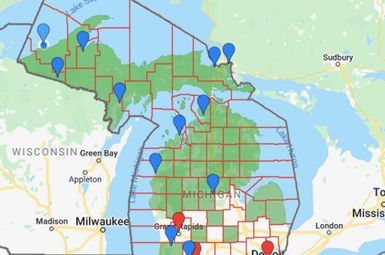
U-M researchers are partnering with the Michigan Farm Bureau to understand the unique challenges rural families face when accessing nutritious meals through food assistance. Often, these programs are designed without the user perspective in mind and are implemented in ways that many families do not find accessible or respectful.
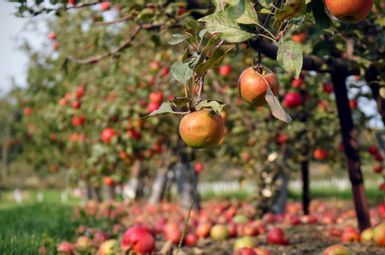
The Michigan Farmworker Project (MFP) is a community-based participatory research initiative aimed at improving the social and environmental health of Michigan’s farmworker population, who play a critical role in the state’s food supply chain. In May 2020, the researchers shared first-of-its-kind findings that provided evidence-based approaches to better protecting Michigan’s farmworkers from COVID-19 while providing essential work during the pandemic.
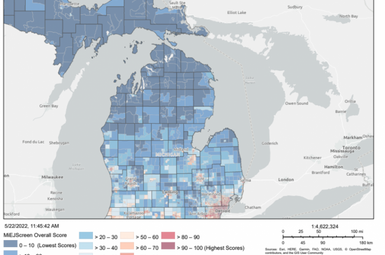
Because environmental justice screening tools will affect community members impacted by disproportionate environmental burdens, soliciting input from the environmental justice community is crucial to developing and using screening tools, according to a new study from U-M.
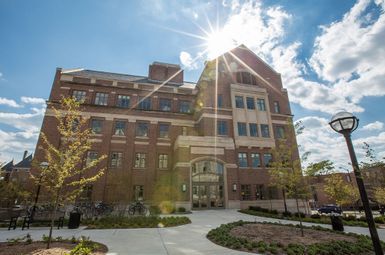
Three tenure track faculty positions will be hired, one each in the Ford School, the School for Environment and Sustainability (SEAS), and the School of Public Health (SPH), to examine the connections among racism and racial violence, environmental injustice and racialized health disparities to achieve better knowledge of the way policies and actions exacerbate or ameliorate unequal burdens of harm, according to the University’s Anti-Racism Hiring Initiative.
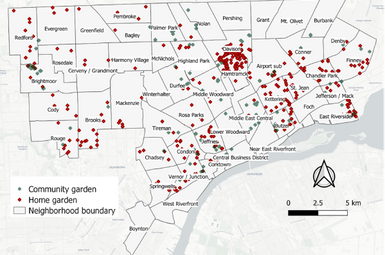
A wide-scale look at Detroit’s urban gardens finds that while they don’t seem to foreshadow gentrification in the city, there are some unsettling trends about where they’re located and the sociodemographics in those areas.
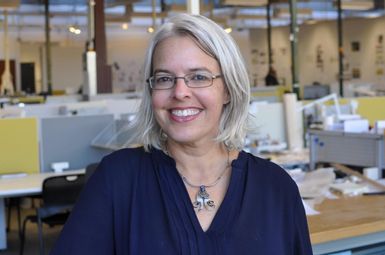
Taubman College Associate Professor of Urban and Regional Planning Lesli Hoey is leading a team of U-M faculty awarded a competitive grant from the Gilbert Whitaker Fund for the Improvement of Teaching to pilot a new Transformative Food Systems (TFS) Seminar. The interdisciplinary team seeks to fill a key gap in U-M’s sustainable food systems curriculum through a new cross-unit course.
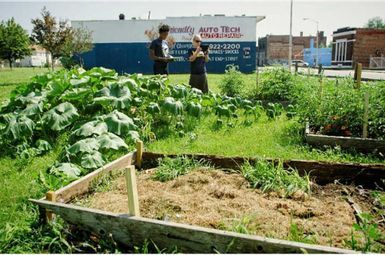
Despite Detroit’s reputation as a mecca for urban agriculture, a new analysis of the city’s Lower Eastside, which covers 15 square miles, found that community and private gardens occupy less than 1% of the vacant land. Even so, gardens there play an important role in reducing neighborhood blight and have the potential to provide other significant benefits to residents in the future.

More than 20% of older adults in the United States will experience food insufficiency at some point in their 60s and 70s, according to a U-M study.
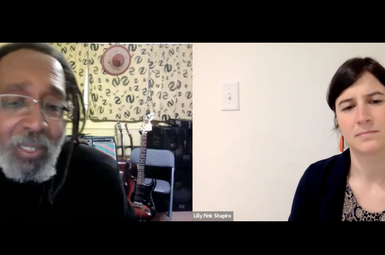
Malik Yakini is a co-founder and executive director of the Detroit Black Community Food Security Network, which aims to combat food insecurity and cultivate food sovereignty in Detroit’s Black community. The organization has operated the city’s largest urban farm, D-Town, in Rouge Park for more than 20 years and is working to launch the Detroit People’s Food Co-op.
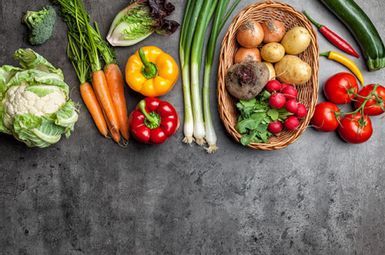
The Food Literacy for All series is a community-academic partnership course that invites guest speakers each week to address “challenges and opportunities of diverse food systems.” Recent speaker Dr. Priya Fielding-Singh, a sociologist and assistant professor at the University of Utah, researches the causes and consequences of health disparities in the US, with a focus on gender and family.

How do various foods and media shape who we are and think we can be, how we want to feel, and what we hope to look like? Are they good for us, or not?
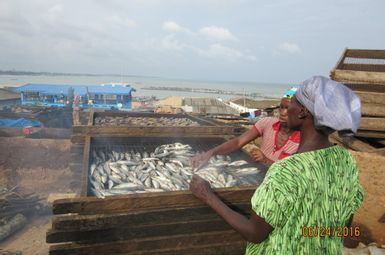
Millions of workers in coastal Africa—most of them women—spend their days preserving fish by smoking them in rudimentary, wood-fired mud ovens. U-M researchers and their colleagues looked at the air pollutant exposures and health symptoms experienced by fish smokers in two coastal cities in the West African nation of Ghana.

To LSA Collegiate Fellow and anthropologist Alyssa Paredes, the banana narrative is a parable for commerce, environmental degradation, and disparity. By uncovering the complex paradoxes and disconnects in the banana industry, Paredes reveals how industrialized food production shapes the fate of many rural regions in our world.
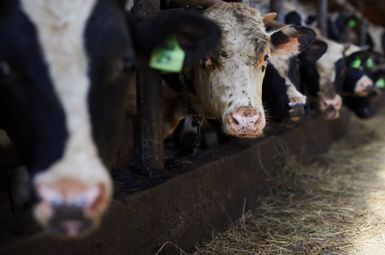
A study published by U-M researchers quantifies the air pollution that impacts Latinx communities in California due to beef production. The study focuses on Costco's beef supply chain in California and explores the environmental impacts of air pollution resulting from beef production in the San Joaquin Valley, a region that has some of the worst air quality in the United States.
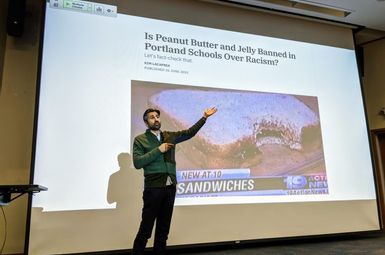
Zahir Janmohamed, co-founder of the James Beard nominated podcast Racist Sandwich, discusses why he thinks the subjects of race, gender, class cannot be separated from discussions about food; and offers advice and lessons learned from his successes and failures to get traditional media to center their stories around non-white, non-male voices.
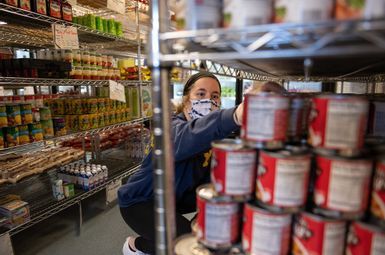
We’ve all heard the axiom: “Give a man a fish, and he will eat for a day. Teach a man to fish, and he will eat for a lifetime.” That’s all well and good, says Alex Bryan, BA ’07. “But it’s a lot easier to learn to fish if you’re not really hungry at the time.”
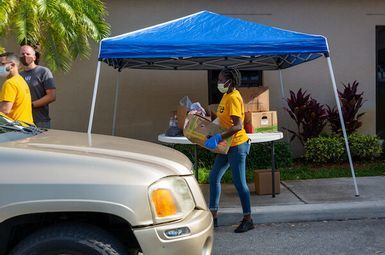
As states started closing schools and issuing stay-home orders in March because of the coronavirus, four out of 10 low-income Americans were already struggling to afford enough food for their households, say University of Michigan researchers. And only 18% of them were able to stock up enough food for two weeks, they say.
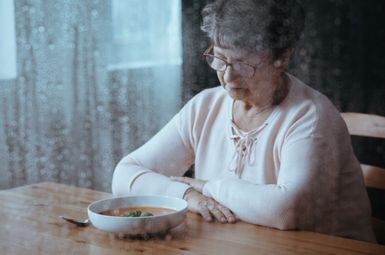
Even before the coronavirus pandemic wreaked havoc with the nation’s food supply and economy, one in seven adults between the ages of 50 and 80 already had trouble getting enough food because of cost or other issues, a new poll finds. The percentage who said they’d experienced food insecurity in the past year was even higher among those in their pre-Medicare years, and those who are African American or Latino.

Children whose families have access to food assistance get more education, live longer and are less likely to rely on public assistance or be incarcerated as they grow up, according to a U-M-led study.
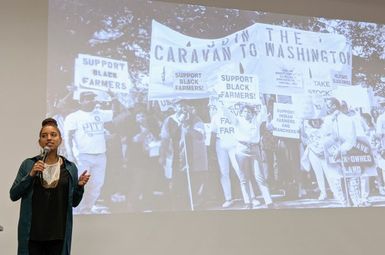
Some of our most cherished sustainable farming practices — from organic agriculture to the farm cooperative and the CSA — have roots in African wisdom. Yet, discrimination and violence against African-American farmers has led to our decline from 14 percent of all growers in 1920 to less than 2 percent today, with a corresponding loss of over 14 million acres of land.
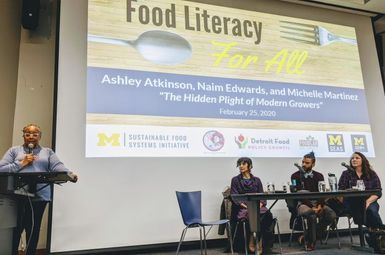
Detroit growers Jerry Hebron, Ashley Atkinson and Naim Edwards and environmental justice advocate Michelle Martinez discuss how climate change directly impacts urban agriculture and environmental issues in Detroit.
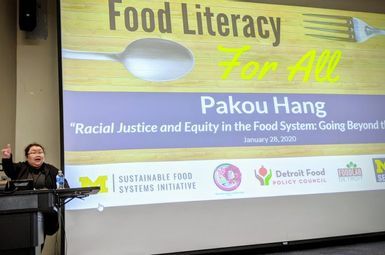
Pakou Hang, co-founder of the Minnesota-based Hmong American Farmers Association, speaks about the policies and practices that can feed a robust ecosystem and support the resilience of farmers of color.
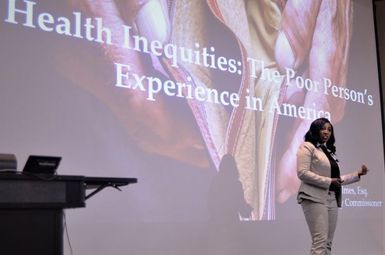
Jessica Holmes presents an overview of the Supplemental Nutrition Assistance Program (SNAP) and the potential impact of recent proposals on food insecure families, noting the impact of poverty on one’s overall health and life expectancy.